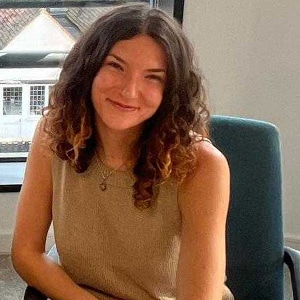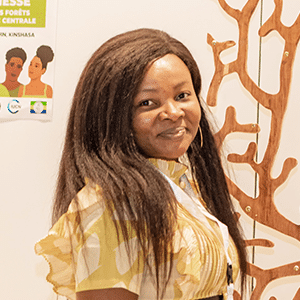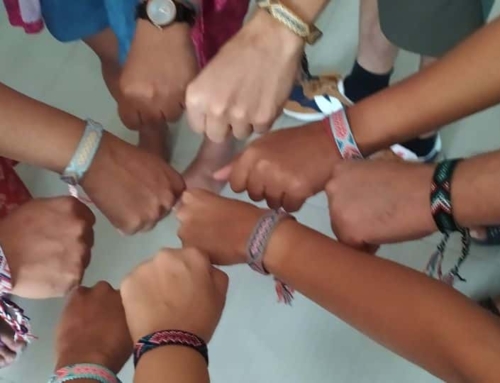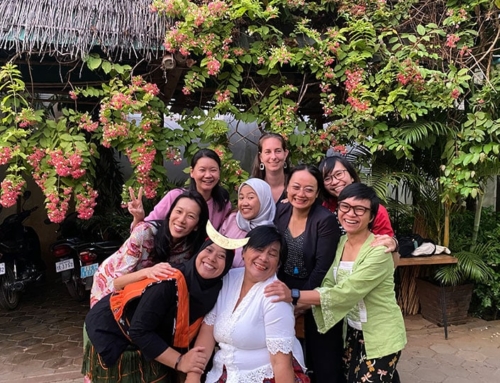In early June, Kinshasa in the Democratic Republic of Congo was the host city for the Congo Basin Forest Partnership’s 20th Meeting of Parties (MOP20), a key opportunity to showcase and share initiatives and approaches aimed at conserving and sustainably managing the forests of the Congo Basin.
This year marked a historic milestone. For the first time, local organisations were granted space to lead a side event at the Conference: ‘Securing Customary Lands and Social Development’, led by four Synchronicity Earth partners, focused on community forestry as an effective means of preserving biodiversity and combating climate change.
The struggle to be heard
Every two years, the Congo Basin Forest Partnership (CBFP) MOP mobilises more than 700 people representing Central African countries, donors, international organisations, NGOs, and research institutions. It is the only major gathering in the Congo Basin and Central Africa that brings all these stakeholders together in one place. Discussions – in the form of side events, round tables, high-level panels, and plenary sessions – focus on the protection and sustainable management of the Congo Basin forests.
This major event is a highly sought-after platform for conservation and management actors, but like many other environmental summits, local communities and civil society organisations often struggle to have their voices and experience heard.
“Our desire was to organise a side event on our results and difficulties. But we had doubts and questions: Would the CBFP accept the participation of four solitary CSOs (Civil Society Organisations)?” Jean-Christophe Bokika Ngawolo, Executive Committee President, Mbou Mon Tour
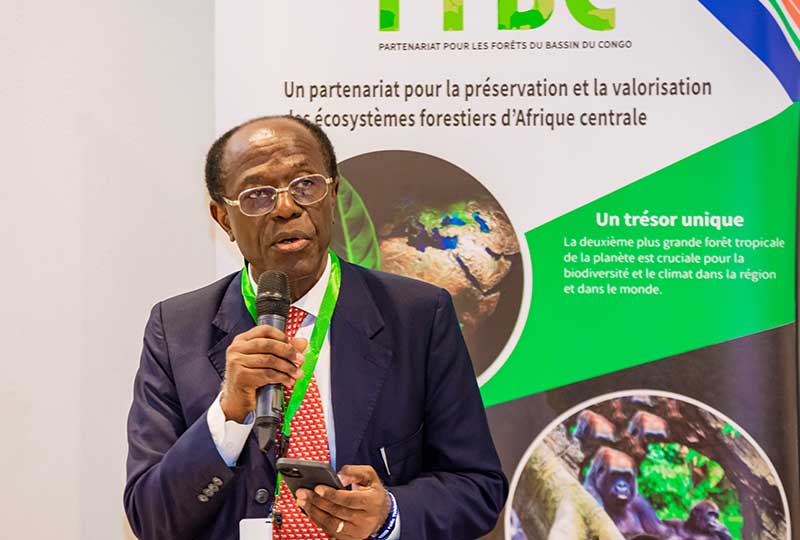
The four groups were facilitated by Synchronicity Earth Affiliates Julie Gagoe and Dr. Bihini Won Wa Musiti, who are based in the DRC. © Merline Touko
Aside from the financial barriers of participating, exhibition stands and discussion spaces are normally reserved for international organisations, sub-regional bodies, and well-known donors. Given the limited slots available, parallel events run in competition with each other.
“Parallel event organisers face the challenge of attracting participants to their side events, especially when they don’t have headliners or renowned personalities on their panels,” Synchronicity Earth Affiliate Julie Gagoe.
Overcoming obstacles
Successfully overcoming these obstacles, four of our Congo Basin Programme partners (Mbou Mon Tour, Reseau CREF, the Coalition of Female Leaders for the Environment and Sustainable Development (CFLEDD) and Green Development Advocates (GDA) from Cameroon) – supported by our Congo Basin affiliates, Bihini Won Wa Musiti, Julie Gagoe Tchoko, and Merline Touko Tchoko -delivered a vibrant and insightful session at the Conference focusing on the importance of securing customary lands and promoting social development.
Though the session was designed for 30 people, more than 50 attended, showing the appetite among conference participants to hear the perspectives and experiences of local community based organisations.
Elevating local perspectives
Synchronicity Earth has supported locally led organisations in the DRC and Cameroon for many years. During this time, their insights on the experiences, successes, and challenges they have faced in community forest management have helped to shape big wins for land rights.
For our partners working in the Congo Basin, issues of land rights and ownership are crucial because they are a means to empowerment. In securing land rights, local communities become more involved in the management of their resources, and better placed to manage the forests. At the same time, developing sustainable socio-economic activities provides alternative income sources, meaning communities do not need to rely on practices that can threaten biodiversity.
Adopting community-led conservation strategies that respect local and traditional knowledge provides the best chance of protecting the species and people that call the Congo Basin’s forests home. This event gave some of the organisations practising these approaches a rare opportunity to showcase their work to their peers and to a range of other regional and international stakeholders:
- GDA shared its experience supporting forest communities and Indigenous Peoples in Cameroon, emphasising the importance of securing land rights and sustainable forest management.
- MMT showcased its innovative approaches in the Mai-Ndombe province in the DRC, blending biodiversity conservation with community development, focusing on the protection of bonobos and sustainable livelihood projects.
- CFLEDD (DRC) highlighted its work empowering women to acquire community forest concessions, protecting nature while improving socio-economic conditions.
- Finally, Reseau CREF (DRC) discussed how its fight against poverty in local communities, through the rational management of forest ecosystems, is making progress towards better conservation outcomes.
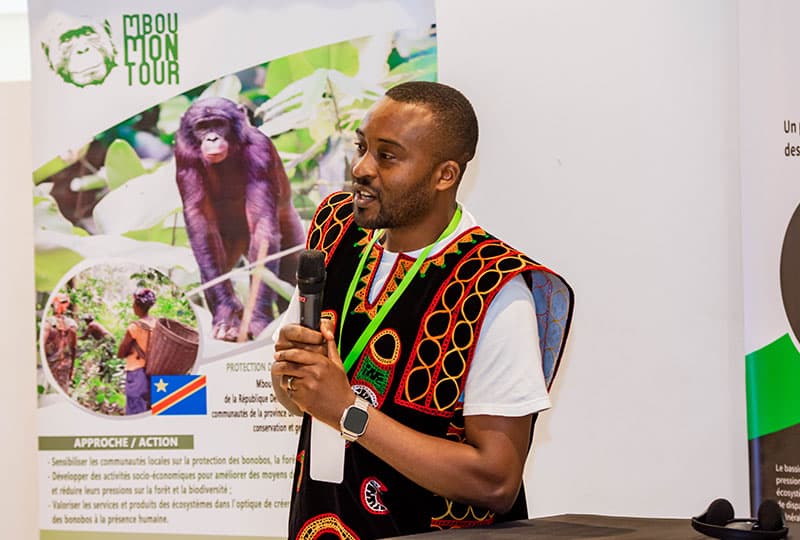
The workshop and panel demonstrated the indispensable role local communities play in managing and conserving forests. © Ferik and Merline Touko
Conserving community forestry
At the end of the presentations and discussions, participants drew up a list of key recommendations placing community-led approaches front and centre:
- Congo Basin states must prioritise the rights and interests of local and Indigenous communities, reviewing their laws to help them secure their customary lands.
- Communities must be supported to strengthen their capacity to take ownership of their initiatives and represent and advocate for themselves in global frameworks and conferences.
- Civil society has a key role in monitoring the implementation of forestry and environmental policies.
- It is vital that the achievements of local or Indigenous organisations are made visible – and successful techniques are shared – through impactful communications.
- Financial support is essential for civil society organizations to improve wellbeing and effectively conserve their forests.
- Locally-led forest concessions have huge potential to reduce poverty and ensure the sustainable use of resources in local and indigenous communities.
Increasing local participation presents a huge opportunity: including people that know the land intimately, and best understand the realities of community forestry, is key to finding solutions that work for both nature and people.
Local voices have always deserved a seat at the table. And there is still space to make decision-making conferences like this more inclusive – ensuring, for example, that women are not just organising sessions, but also leading them.
Though long overdue, this opportunity to hear directly from local led, community based organisations is nevertheless a welcome step in the right direction, and one which we hope sets a precedent for Congo Basin conservation in the future.

Attendees shared their responses to ‘What does community forestry mean to you?’. The most common answers were ‘sharing’ and ‘participation’. © Ferik and Merline Touko
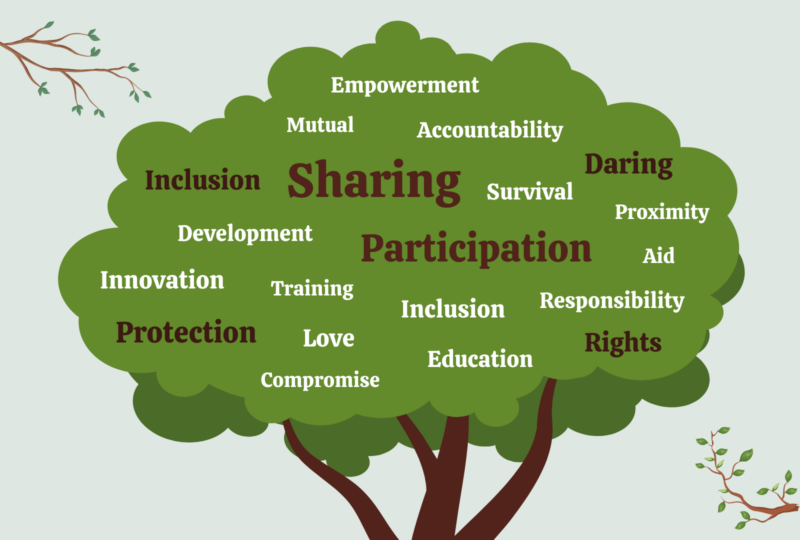
We support communities and Indigenous Peoples to defend their territories and rights through our Congo Basin Programme.
Learn more about the importance of securing land rights for forest peoples in the Congo Basin.

